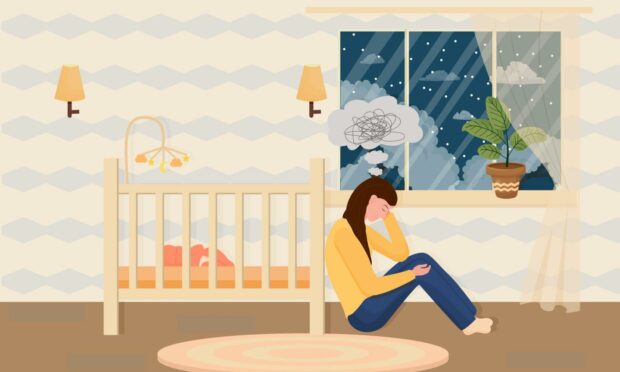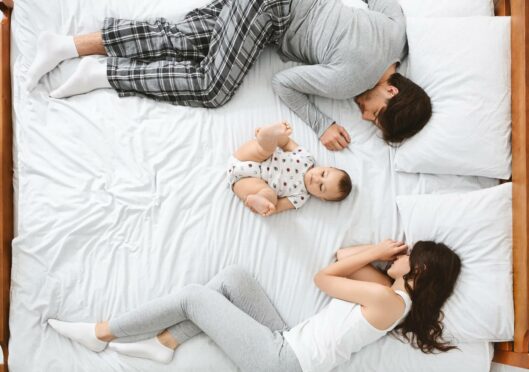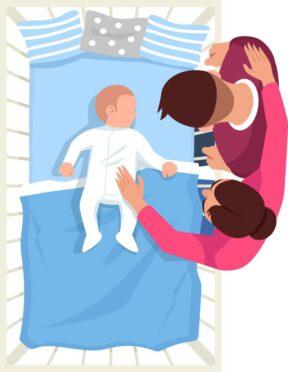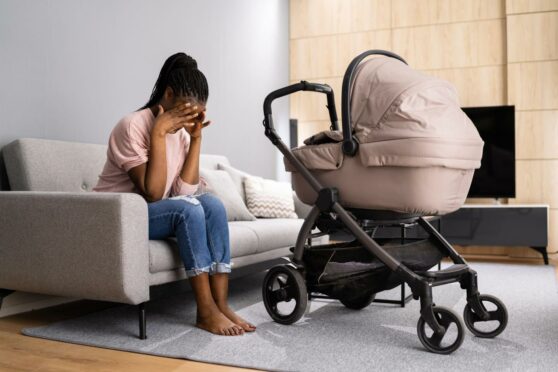We’re bombarded with messages that sleep is vital for our physical and mental health. Sleep allows the brain to process information, the body to recover from the day, our heart rate and breathing to slow down and hormones to regulate, among other things. So if you’re a new parent, that messaging can make you feel quite powerless.
“Sleep while you still can,” everyone told me before I had a baby. We’re conditioned to understand that “newborn equals tiredness”, so of course everyone expects multiple night-time waking and early mornings. But I didn’t really expect not to have a full night’s sleep for almost a year – and the impact that would have.
“The lack of sleep can be a huge surprise when you have a new baby,” says Lucy Shrimpton, sleep expert and founder of The Sleep Nanny (sleepnanny.co.uk). “It is another level of tiredness and can be a huge shock to the system.”
“You have a concept of what not having sleep is like – but actually the reality of it is stark,” adds Dr Nihara Krause, consultant clinical psychologist at Bloss (Blossapp.com).
What’s the impact on health?
While in the short-term, deficient sleep is likely to make you irritable, lack focus and affect your mood. Krause says: “Long term, new parents are at risk of increased anxiety, depression, general fatigue [and] burnout. If you have a vulnerability to postpartum depression then it can highlight that. If you have a prenatal history of mental ill health then that can be very sensitive to long-term sleep deprivation.”
The problem is often a lack of REM sleep – the deepest kind – because many new parents tend to sleep much more lightly than before, because they’re so aware of the tiny human now present.
“It’s just not refreshing sleep,” says Krause. “You’re not going to process things in the best possible way, your reflexes might be slower, your memory might be disrupted (because a lot of our short-term to long-term memory storage happens during sleep). It can also have a physical impact in terms of more likelihood of lower immunity and delayed repair.”
What about psychologically?
“Sleep deprivation is used as a form of torture and there’s reason for that,” notes Shrimpton, “it makes you operate from a place that would be measured as insane – where you’re totally irrational.” Any less than five hours of sleep in 24 hours, broken or otherwise, is far too little to operate on psychologically, she says.
There’s an additional mental torment in not knowing when your baby’s sleep might improve too. The impact of that particular unknown is “huge”, says Shrimpton. “When you’re in it as a parent and your baby is four months old, you do momentarily think, ‘This is my life now’. You don’t have a grasp on the fact that in a few weeks or a few months’ time, you’ll be in another place.”
Psychologically, I could cope with very small – or even no – improvements in sleep, night on night. But when setbacks occurred, it was particularly challenging mentally.
“One of the most difficult things is the unknown,” agrees Krause. “We all experienced it a little bit when we went through the pandemic, but the unknown is something that is almost hard-wired into our brain to be seen as us under threat, and it’s dangerous.
“If the unknown goes on for a long time, people can start to feel really helpless, which is the last thing you want when you’re a new parent. With time, that can lead to depression.”
Can sleep deprivation do permanent damage?
“It will go back to normal,” reassures Krause. “Ultimately, our bodies and brains are absolutely wired to protect. So while the anxiety will say, ‘I’ll die if I don’t get enough sleep’, if you really don’t have enough sleep, your body will be forced to do a sort of catch-up sleep at some point.
What can actually help?
By six to eight months, some parents choose to enlist professional help.
Krause acknowledges the “sleep when the baby sleeps” advice is “really irritating – because it’s not that easy”. Between work, other children, additional responsibilities, and babies who contact-nap (on you), often it’s just not possible. But, she says, “a nap here and there really helps, even 10-15 minutes seems to help a tiny bit.”
Shrimpton says: “If you can just put your feet up and rest, put your phone away, don’t read anything, don’t do anything physical, just listen to some music or meditate and that will make a huge difference.”
Asking for help is crucial though. “There’s something about new parenthood and thinking, ‘I can’t [get help] because people will think I’m not a good enough mum or dad’,” Krause says. But we don’t have to do it all ourselves.
Try a shift-like pattern with your partner, and pump or mix feed if needed. Shrimpton suggests “two nights on, two nights off – that’s better than alternating, as you get proper rest that way and you recover”.




